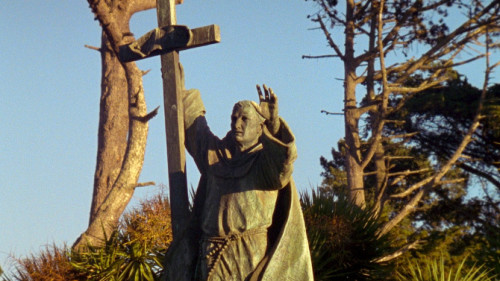Written by Ren Jender.
Writer-director Jenni Olson’s latest film, The Royal Road, which received good reviews when it played Sundance earlier this year and will be the closing night offering at Art of The Real, April 26 at the Lincoln Center in New York, has a structure similar to Olson’s 2005 film The Joy of Life: personal narration accompanying static shots of California vistas. All the scenes in Road, as in Life, are living snapshots, still except for moving water, wafting smoke and cars making their way down the roads, absent of people (except in the narration), even the drivers unseen.
Olson is one of the only butch-identified filmmakers who also makes films about butch identity. The closest another recent film has come to including “butch” anything was Blue Is The Warmest Color, a film from a straight male director in which a straight actress, Léa Seydoux, played a recognizable butch. In that role Seydoux was still firmly within the bounds of what straight male directors and producers deem “fuckable“–conventionally pretty and sexy even with short hair, minimal makeup and “tomboy” outfits.
In Road, Olson talks about gender dysphoria and identifying with men, name-checking Hitchcock and Vertigo as well as filming at a couple of its famous locations. But Olson doesn’t seem to have a much deeper understanding of the women in Road’s narration (Olson also does the voice-over) than Hitchcock did of the “troubled” women characters in his films: men who ignore women’s wants and needs have historically portrayed women as “mysterious” or “unpredictable” the same way traffic can be “unpredictable” when you are busy staring at your phone. Olson calls the women “crazy” when a better description would be “fucked up” and Olson admits to being a bit of a fuck-up too.
The film could use more of Olson’s writing, whether we hear about the “square lips” of one woman Olson becomes obsessed with or this description of Los Angeles. “I’m invigorated by the sense of possibility here. People believe that good things will happen at any moment,” which immediately evokes the confident, charismatic people one finds in LA, so convinced they will attain success, their continued obscurity ends up surprising the rest of us as much as it does them. I would have liked more observations like this one and more detail instead of the generic history lesson we get about El Camino Real (the Royal Road of the title), which seems lifted directly from an unimaginative professor’s PowerPoint presentation.
The problem with movies from queer filmmakers about queer people, like films about feminism from feminists, is that we don’t have nearly enough of them, so we expect the few that we see to be all things to all people. Although I fight this desire in myself I can’t help wishing The Royal Road was more vivid: bolder and dirtier. Olson says, “I want to tell you a story of love and loss in San Francisco that reveals more about me than I ever expected to say,” but in this age of first-person essays that are volcanoes of folly and regret, the revelations in the film seem as innocuous as a very young child’s church confession.
At one point Olson talks about identifying with Casanova, whose memoirs were so scandalous that an uncensored version of them couldn’t be published until 150 years after his death. In contrast Olson’s memories of the two women in Road are weirdly chaste–we don’t have a sense of Olson ever getting lost in desire and possibility, let alone the two women, one in San Francisco, the other in Los Angeles (specifically Los Feliz or “The Happy Place” as Olson sardonically translates it) doing so.
Life’s focus on suicides off the Golden Gate Bridge (and Olson’s advocacy for barriers to prevent people from being able to throw themselves off the side) meant that film felt a lot more urgent and emotional than this one does. The women are closed off to Olson, who in turn feels closed off to us, the way an artist should never be with an audience. I didn’t have to fight sleep during Road the way I did during Goodbye To Language but something nagged at me during its even briefer run-time (65 minutes): I should feel a lot more affinity for a 50-something American queer who chases after “unavailable” women than I do for an 80-something straight, French-Swiss guy who loves his dog–but I don’t.
Late in the film, Olson tells us, “All I want to do is read novels and go to the movies,” touching on the collective predilection for getting away from horrible headlines and messy incongruities to give ourselves over, during our rapidly shrinking leisure hours, to dramas that take place in another time (Mad Men, Downton Abbey) or in another world (Game of Thrones). But Olson never gives us the same chance to do the same in Road. Olson says, “I’m inordinately obsessed with the stories of others, seeking within them the key to sharing my own,” but the stories in the film aren’t ones we are likely to obsess over too, which may be this film’s tragedy.
Ren Jender is a queer writer-performer/producer putting a film together. Her writing. besides appearing every week on Bitch Flicks, has also been published in The Toast, RH Reality Check, xoJane and the Feminist Wire. You can follow her on Twitter @renjender


